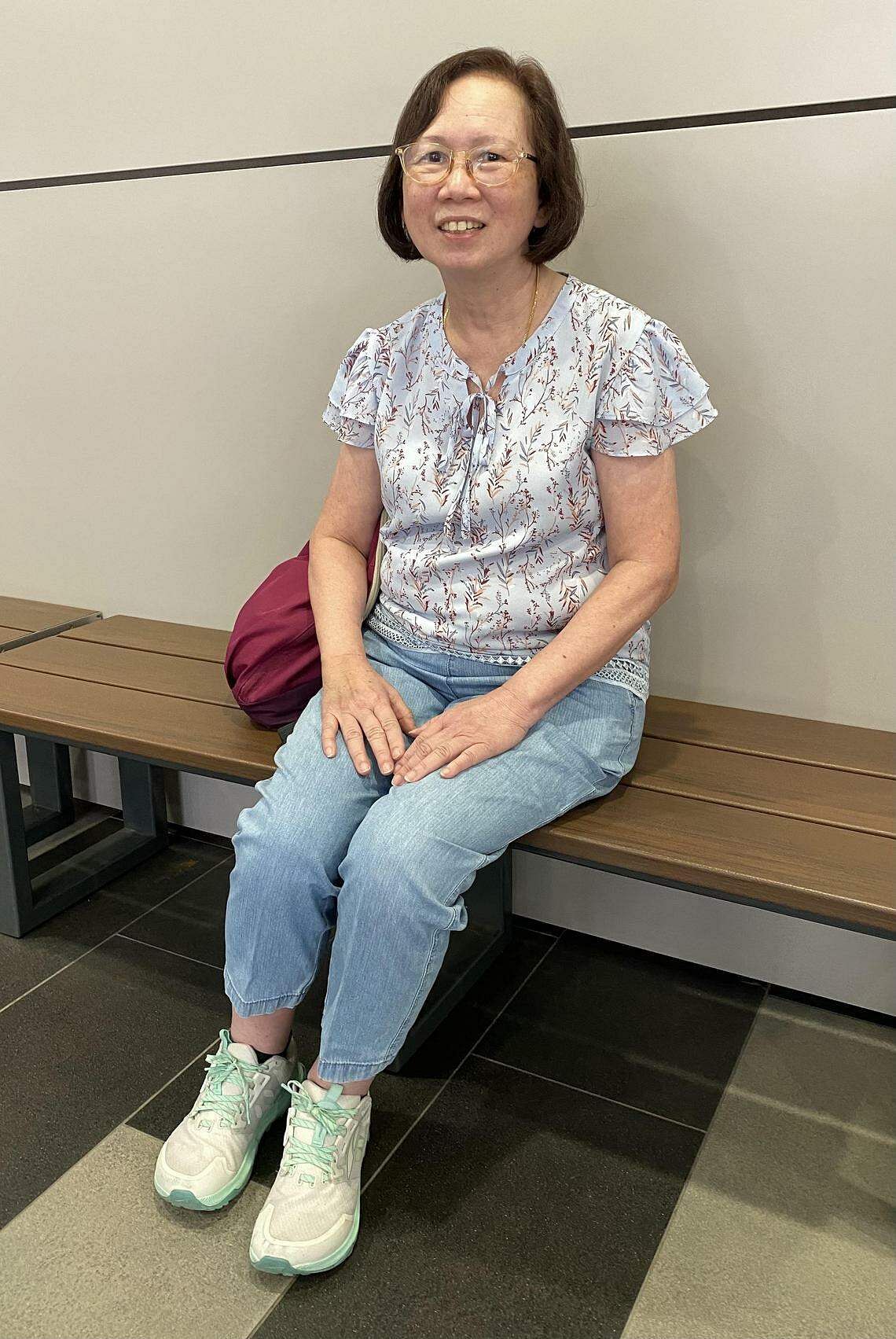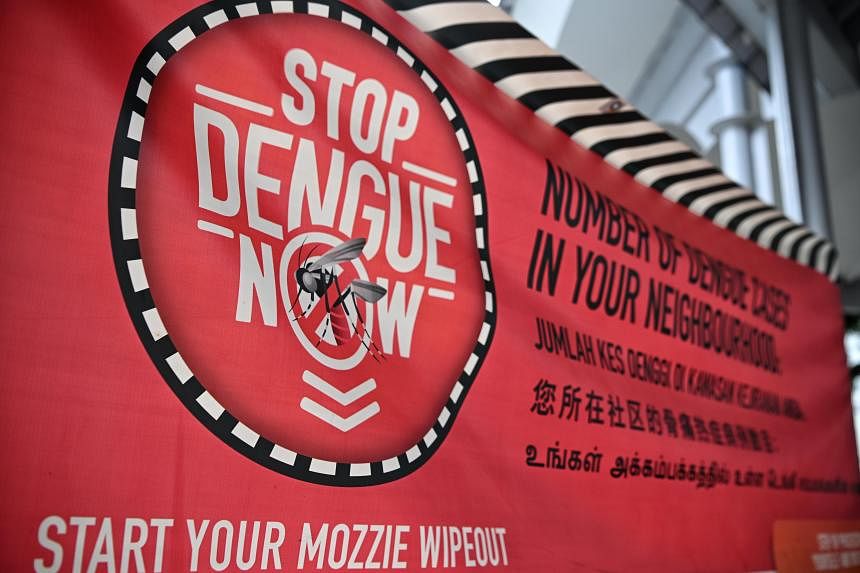SINGAPORE – Dengue cases continue to rise here, with the number of new infections hitting 416 in the week of March 31 to April 6. This is 67 cases more than in the previous week.
Already, more than 5,500 people have contracted the infection in the first 14 weeks of 2024, according to National Environment Agency (NEA) data. And, as at March 25, seven people – most of them elderly – have died of dengue.
In 2023, the number of dengue cases stood at 9,949, and there were six deaths that year.
There are currently 90 active dengue clusters, of which 20 have 10 or more cases, NEA said.
Several clusters where a fast rate of dengue transmission has been observed include a 118-case cluster in Ang Mo Kio Avenue 3 and Avenue 4, an 83-case cluster in Marsiling Road and Marsiling Rise, and a cluster of 53 cases in Gangsa Road.
Cases in Singapore have shot up ahead of the traditional peak dengue season from May to October, and Senior Parliamentary Secretary for Sustainability and the Environment Baey Yam Keng had warned of the rise when he launched the National Dengue Prevention Campaign 2024 on March 31.
NEA said that since the start of 2024, the weekly number of reported dengue cases has remained high, at above 300.
This, coupled with the high Aedes aegypti mosquito population and the low population immunity to all four dengue virus serotypes here, may lead to a surge in dengue cases in the coming months, if insufficient action is taken, the agency added.
Professor Hsu Li Yang, an infectious diseases expert at the NUS Saw Swee Hock School of Public Health, said: “We are certainly seeing a higher number of cases during this period as compared with the past few years, with the possible exception of 2020.”
In 2020, there were more than 35,000 infections and the highest number of dengue deaths, at 32.
The rise in cases in 2024 could be due to a combination of different factors, with the heat being one possible reason, Prof Hsu said.
NEA has also reported an increase in mosquito-breeding sites, both in and outside of residences.
A dengue infection is not usually serious – the majority are asymptomatic – but it can be unpleasant for some and, in rare cases, severe dengue and even death can happen.
People who are older, as well as those with pre-existing medical conditions, are at higher risk of severe illness due to dengue infection, said a spokesperson for the Ministry of Health (MOH).
Those with a second infection also risk a severe illness, as repeat dengue infections have been associated with a higher occurrence of severe dengue.
Madam Geraldine Tham, 70, was one of them. She fell ill with dengue fever in March and was hospitalised in early April at the National Centre for Infectious Diseases (NCID). It was her second dengue infection, and she had diarrhoea, vomiting, stomach cramps and felt cold. Her platelet count dropped so low that the healthcare staff asked her to remain in bed to avoid falls, as there was a risk of profuse bleeding if she were to sustain a cut.

“I got a headache, rashes on my legs and a heavy head,” said Madam Tham, who works as a corporate support officer in a school. Brushing of teeth was also out, as there was a risk that her gums might bleed.
Fortunately, she recovered and was discharged on April 5.
Dr Chia Po Ying, a consultant at NCID, said that a blood test to diagnose dengue is usually performed when there are symptoms such as sudden fever onset, headache with or without pain behind the eyes, muscle or joint pains, and nausea and vomiting. Symptoms that can develop later include skin rashes, easy bruising and bleeding from the nose or gums. Some older patients, however, may just have fever, she said.
She added that dengue patients who require hospitalisation are predominantly older adults with comorbidities.
The majority of NCID dengue patients do recover well, but there has been a small proportion of patients being admitted with, or who develop, complications, including severe cases, who require intensive care, she said.
For private tutor Edwina Shaddick, 35, who caught dengue in 2022 together with her sister, the experience was unpleasant, even though they were able to recover at home. She said she was more or less bedridden for nearly two weeks.
After the sisters recovered, their brother and father came down with dengue fever. Their mother, who also lives in the same household, was the only one who was not affected.
Dengue does not spread from person to person directly. But if a person has dengue, the virus will be in his blood during the first week of infection. If a mosquito bites him during this time, it will become infected with dengue and can then spread the virus to other people through bites.
“Even if one has been diagnosed with dengue, the continued use of insect repellent is recommended to prevent onward spread of the dengue virus to mosquitoes and other people in the community,” said Dr Chia.
Ms Shaddick said that the family admitted her father, who was then 72, to hospital because his platelet count dropped to a very low level.
But he checked himself out of hospital so that he could recover at home. “It was quite terrifying because we were worried that he would slip and fall in the middle of the night and then bleed to death,” she said.
Dr Chia said that younger people who do not have any pre-existing medical conditions can also suffer from severe dengue.
Logistics manager Lynn Ng, 43, who got dengue in June 2022, recalled feeling “really, really tired” and slightly nauseous about three days before she checked into a hospital.
She also had a throbbing headache. By the time she sought help at the hospital, she said she could hardly walk.
The first night in the hospital, Ms Ng said she kept pressing the call bell for a bag to vomit into. “At one point, I puked out some blood. I lost my appetite and hardly ate.
“I couldn’t sleep at night. I was so uncomfortable that I didn’t feel like looking at my phone or watching TV. I just laid there on the bed.”
After being discharged, the typically athletic woman was not her usual self.
Ms Ng caught Covid-19 later on, and said her dengue experience was far worse. It would be a few months before she regained her fitness.
NEA has urged the public to remain vigilant, use insect repellent and clear out stagnant water.
Prof Hsu said: “Perhaps the main thing is to take precautions against being bitten by mosquitoes at dengue hot spots, and to do our part in eliminating potential mosquito-breeding spots.”
MOH advises people to seek medical attention with their primary care doctor if they suspect they have dengue. Those with severe symptoms should seek medical attention immediately.


